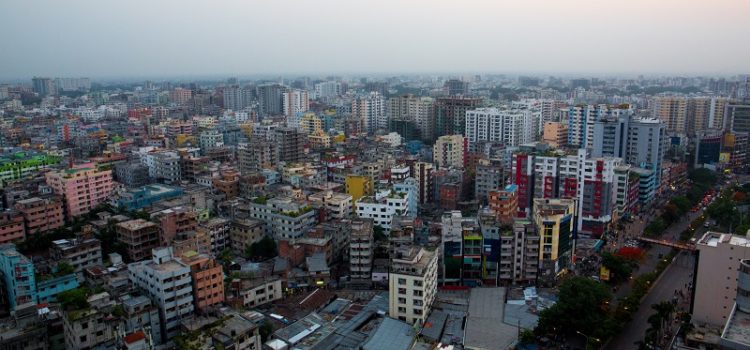‘Pandemic gives us window of opportunity to adopt sustainable adaptation practices’

Bangladesh lifted a national lockdown of more than two months on the 31st of May 2020, even though the number of coronavirus cases continues to surge in the country. Dr. Md. Munsur Rahman, Professor, Institute of Water and Flood Management, Bangladesh University of Engineering and Technology, Dhaka, speaks to ICLEI South Asia about the impact of the crisis on research work at his institute, the need for sustainable practices to tackle the pandemic and on building climate and health resilience in South Asia.
How has the Covid-19 crisis impacted your work?
The COVID-19 crisis has affected our research at IWFM, BUET, which was being conducted by groups of faculty members and graduate students. The government had announced the closure of all educational institutions from the 17th of March 2020. All official research was suspended. A week after the lockdown was imposed, research work was restarted through work at home, and online weekly and monthly meetings were held to review the progress and discuss further plans. However, there were a few problems such as non-availability of lab facilities at home.
Most of the students were staying outside Dhaka, and some of them had problems accessing the Internet. Additionally, online peer group discussions and learning are not as effective as face-to-face interactions, but we have to accept the new reality. Field-level activities/demonstrations have also been also delayed or postponed due to the pandemic; innovative approaches are now required for field research to be conducted.
What changes are you expecting in the near future in terms of your work?
If the pandemic continues, further field-level activities/demonstrations will not possible, even with different project timelines. It will be more difficult to do action research. The fear over the pandemic will impact human behavior (such as maintaining social distancing). At such a time, action research such as demonstrations, training, or prototype research would have to be conducted using different innovative approaches. Practices such as online training will become the new normal.
Are you working on any plans to tackle the pandemic?
Yes, we are thinking of revisiting the adaptation options already identified in the project to tackle the pandemic. We can focus on ensuring that a healthy ecosystem is the key adaptation option; that infrastructure /adaptations are sustainable; and that there is field-level learning on adaptation in agriculture from Bangladesh’s perspective.
While the above issues cannot be addressed within this project because of the limited time-frame, we definitely need to work in these areas.
Are you evaluating and monitoring environmental changes also?
Our current work is on spreading awareness about the impact of climate change, training local people, and demonstrating climate-adaptive livelihood practices in areas that are geographically vulnerable to climate hazards in south-central Bangladesh. The study areas selected were Galachipa Upazila of Patuakhali district, which has been affected by storm surges, and Barguna Sadar Upazila of Barguna district, which has been affected by salinity. The aim is to share knowledge with the rural community, make them aware of the need to adapt to climate change, train them on adaptive practices, and demonstrate gender-responsive aquaculture and integrated homestead plantation. About 350 households were surveyed in both study areas in October and November last year, and 50 participants were shortlisted in each for training in climate adaptation and livelihood. But the demonstration has been delayed due to the pandemic; it will be resumed if the project is extended after the pandemic is over.
The study revealed the understanding of the rural poor about climate change and adaptation and their activities as well as their indigenous and traditional adaptation practices. The concept of gender-exclusive adaptation was shared with the participants; it would help to make them more resilient in fighting climatic change. The study will also assist in making policy-level decisions on the extent of adaptation/development that will be needed to improve the socio-economic condition of poor people to help them fight climate change.
What are your recommendations for public and private organisations in the context of climate change?
The research reports of different international organisations say that after the pandemic, poverty will increase worldwide and development will be affected. Many vulnerable people will lose their sources of livelihood, bringing starvation and hunger. Additionally, climate change impacts will make them refugees. But these are the findings based on macro-level analysis and many of these are not applicable in Bangladesh. We have some important issues that need to be considered by the public, private, research, and NGO sectors.
The pandemic has provided us a new window of opportunity to adopt sustainable adaptation practices. There are several instances that prove nature needs some breathing space, and ecosystem-based adaptations should be taken up on a priority basis. A healthy ecosystem is a key to sustainable development and adaptation. Farmer-friendly adaptations in agriculture (such as the arrangement of transport for agricultural labour during the Boro rice harvesting season in haor or wetland in north-eastern Bangladesh) need to be documented at different knowledge platforms. We would like to request ICLEI South Asia /CDKN to document these instances in their knowledge brokering platform as quickly as possible. False adaptations, especially adaptations targeted for export-oriented production/earnings without considering the local ecosystem’s health, need to be avoided in climate change adaptations. IWFM, BUET will be happy to assist in these activities with its well-qualified faculty and students.
What government measures should be taken to improve health resilience in South Asia?
Ensuring a healthy ecosystem is the key to building the health resilience of the people. Just as there is a ban on Hilsa fishing for a certain time period (a very successful policy intervention), the entry of people to sensitive eco-tourism sites should also be banned for certain periods. This would ensure healthy ecosystems that eventually would improve the resilience of the community attached to it.



